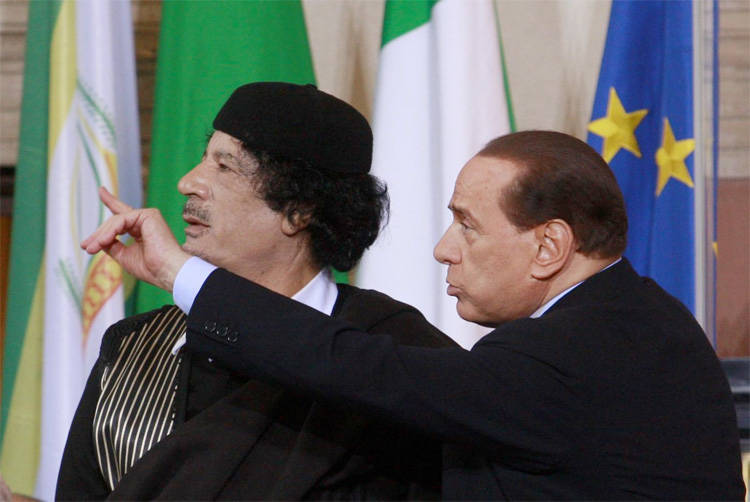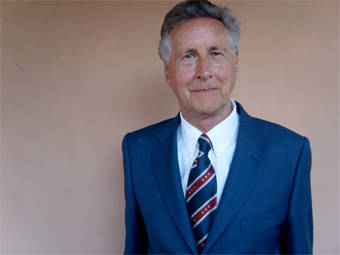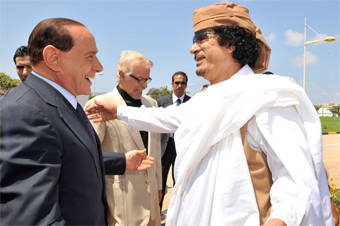A Veteran Italianist Looks at Libya. Interview with David Willey
ROME –David Willey, a reporter who has covered Italy and the Vatican since 1973 for the BBC, is the quintessential British subject. Cambridge educated, he speaks such excellent English that his broadcasts are used for teaching the language. At the same time he has a special affinity for Italy, for his grandparents were emigres to London from the Veneto, and his mother took great pride in her own Italian roots, sending young Willey to Italy for vacations with the Veneto cousins.
Between then and now he covered the Vietnam war and, for the past twenty years, frequently covered Libya, where in 1986 he came under the bombs of American-British planes, was once arrested by Gaddafi’s police and twice interviewed Muammar Gaddafi himself. Most recently he followed Gaddafi’s state visit to Italy, a celebration of an unusual treaty between the two countries. In an exclusive interview we asked Willey to give us a personal close-up view of Gaddafi himself, of the country and of what makes the Italian-Libyan treaty of 2009 so unusual.
In a word, how would you describe Libya?
Dramatic. It is not a normal country—its dramatic geography shows 95% desert, with only a narrow habitable coastal strip. Almost all inhabitants live in coastal cities. It is in fact two countries—Tripolitania and Cyrenaica, which are divided by geography and by tribe. This makes Libya more a geographical expression than a country likely to have a united future.
What is your personal view of Gaddafi—what kind of a man is he?
He is a man of little formal education who nonetheless prides himself in having written a book of political philosophy, the Green Book, which purports to set out a blueprint for life and for a government ‘of the people, by the people and for the people,’ but which bears little resemblance to any known political system in the world. I’ve read it—he personally gave me a copy. At one point ambiguous phrases from it were hung up in banners at Tripoli Airport, such as, ‘All power is latent.’ Few travelers could figure just what that meant.
Can he resist today’s attempts to unseat him?
His whereabouts are always kept secret, and he is said to sleep in a different bed every night, in a country that is vast. He comes from a Bedouin tribe, and Bedouins are nomads so this nomadic existence is completely in character with the history of his family and of his tribe. Muammar Gaddafi has been in power for forty-two years. He has shown himself to be eccentric and unpredictable, but the mere fact that he has survived numerous assassination attempts shows what a survivor he is. He came to power at the age of only twenty-nine. Although his face appears ravaged despite plastic surgery, he is still under seventy years of age and retains both the will and the resources to continue to defy those wishing to unseat him. His financial resources help: he is sitting on a pot of gold and dollars, in cash, which he is prepared to disperse to keep himself and his family in power.
What impression does he give during an interview?
He has a good working knowledge of English because he was trained in the UK by the British army, but is reluctant to speak English in public, preferring to speak Arabic. He is canny but also very prolix—like Castro, he tends to speak for hours, and even during interviews his answers are long and sometimes rambling. He has immense charisma and is clearly in control of the military machine which the coalition forces are now doing their best to destroy. The contrast between his military forces and the ragtag followers of the rebel army is acute, however, and no one should conclude that the rebels can have an easy victory. I also attended the 40th anniversary celebration for his revolution in 2009, when he erected a giant tent on the Tripoli waterfront and hired a troupe of 800 actors, musicians and dancers to put on a three-hour sound and light extravaganza, which culminated in a gallop by a thousand Berber warriors on horseback. What was notable about this spectacle was the limited size of the audience: there were Gaddafi himself and a dozen heads of African states, senior military officers and a small group of foreign journalists. The people of Tripoli were unexpectedly shut out of the park in which this megaspectacle took place from midnight to three am. Earlier that day the Italian Air Force acrobatic team had performed a courtesy fly-past with their trademark red, white and green vapor trails, the color of the Italian flag. Gaddafi found this hard to swallow and ordered the vapor trails to be photo-shopped to show only the color green, the official color of the Jamahariyah, the revolutionary republic of Libya.
Tell us about the Libyan-Italian friendship treaty of 2009.
The treaty put an end to decades of dispute between Libya and Italy over compensation for the misdeeds of Italian colonial rule from 1911 through the end of WWII. Italy agreed to pay Libya a sum of $20 billion over a period of 20 years, of which the major part would be spent on construction of a coastal highway stretching from the borders of Tunis to Egypt. This was essentially an upgrading of the century-old military road built by the Italian colonial regime. In fact, the cost of this huge engineering enterprise is to be borne by the Italian oil company ENI, which, under the treaty, in exchange obtained favorable treatment for oil exploration during the decades to come. The cost will be deducted from a levy on their profits. In short, the Italian taxpayer will not fund this blood money compensation—it comes out of Libyan oil money. It is a form of kickback, and the Libyans themselves will pay for it.
Another part of this complex relationship as codified in the treaty concerns Italian support of Libyan naval patrols in the Mediterranean aimed at preventing sub-Saharan African emigration, including of people working in Libya, or making hazardous journeys across the immense desert.
How do you feel about what is going on these days in Lampedusa, with fishermen blocking the harbor, a serious sanitation problem and residents infuriated?
Initially the residents treated the new arrivals with generosity, bringing them towels, food, water. But Lampedusa is an island, where such resources are limited by geography, and this week there were 6,000 immigrants for just 5,000 inhabitants. I hope that the Italian government's action plan announced Monday is successful, but this dire situation could and should have been foreseen. Nothing can justify the lack of advance planning.





































i-Italy
Facebook
Google+
This work may not be reproduced, in whole or in part, without prior written permission.
Questo lavoro non può essere riprodotto, in tutto o in parte, senza permesso scritto.